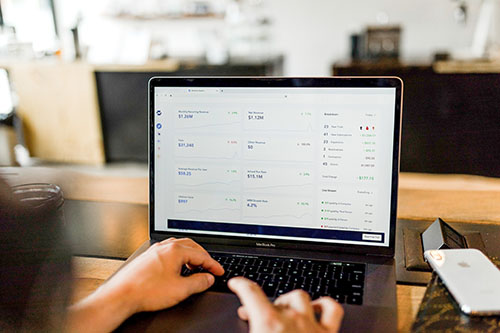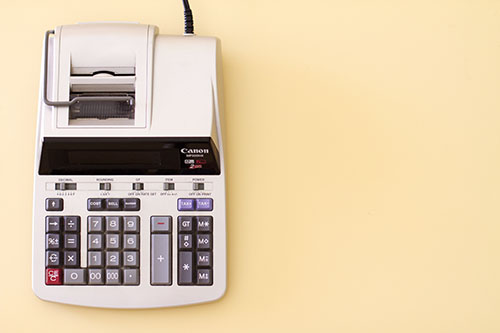FDIC-Insured—Backed by the full faith and credit of the U.S. Government.
Credit
Discover how to obtain credit, how to use your credit wisely, find out what your credit score means, learn about the various types of loans, the ins and outs of getting a loan, smart ways to manage your debt, or just read through the various credit definitions.
What is Credit?
Credit is a financial tool that provides the power to buy things that you may not have cash to pay for at the time of the sale. No matter what method (credit card, loan, etc.) you use to pay for the item, it is all credit for you to use.

And how much "credit" you have will depend on your ability to be responsible with your debts and repay your creditors (those that provided the funds for you to make purchases) within the timeframe established. The more responsible you are, the more credit you will have in the future.
Because of that, it is important for you to build a strong credit history and work at keeping it that way. To help you build a strong credit history, you need to understand what makes your credit strong. As was mentioned before, financial responsibility to pay off creditors within an established time frame will do it.
But that isn't the only factor involved. Consider your employment history as a factor in creating a strong credit history. Why? Think about it; if you have a history of unemployment, you are a risk for not being able to fulfill your debt responsibility if you are given a loan. . .even if you are employed at the time.
Using Your Credit Wisely
"What's in your wallet?" Capital One has used that catch phrase in their commercials to try and point out that their credit card is what you should be using. But does it really matter which credit card you have if you aren't wise in your use of it?

Credit as a single word has many definitions in Webster's Dictionary. One of the definitions is "influence or power derived from enjoying the confidence of another or others." When you look at the word credit from a financial point of view, this is most definitely the way it is.
Another definition given for the word credit that is relevant to this article is "financial or commercial trustworthiness." When you consider that the topic of this article is a display of financial trustworthiness and "financial" power derived from the confidence that others (in this case creditors/lenders) have in you, you can see the importance of being wise in your financial decision.
A credit card is a tangible object that puts us in a position of receiving trustworthiness and displaying financial power. As you read through this article, you will see how using credit (financial trustworthiness) wisely when using your credit card can help you throughout your life.
Your Credit Score
What is your credit score? Don't know? You should. If you aren't aware of what your credit score is, how do you know how creditworthy you are? You may think you have an idea, but you really don't unless you understand what a credit score is and how it is calculated.

A credit score is a three digit number that implies how creditworthy you are and how likely it is that you will repay any loan that you receive. The number is based on a statistical analysis of a person's credit files.
If you have read the articles "Obtaining Credit" and "Using Credit Wisely", you will have already learned a lot about credit and how your credit standing is affected by how well you manage your finances, specifically the use and repayment of credit cards, the acquiring and repayment of loans, and the wise (or unwise) decisions you make in handling the responsibility of loans and credit cards.
In most cases, when people talk about credit scores, they are referring to FICO credit scores. What is FICO? It is actually an acronym for Fair Isaac Corporation, the company that developed the system to calculate credit scores. Unfortunately, when you reference a FICO score, you could actually be referencing three different scores.
Types of Loans
Loans. Debts. One leads to the other, yet you want to get one without the other. Sorry Charlie, you are out of luck. But since you need the first, you better know what types of loans are out there and get the right one so that you don't end up with more of the latter than necessary.

Generally, as a borrower you will go to some sort of financial institution, bet it a bank, credit union, payday loan business, etc., and request a loan for a certain amount. They will ask you what you are going to use the money for. The loan should be tailored to fit the need.
It will also be tailored to fit your credit worthiness. As a result, the amount of money you get may be different than what you were hoping for. The interest rate you pay back may also be different than what you were hoping for.
But you really need the loan so you are willing to take what you can get. Congratulations, you just borrowed yourself some a debt. And with that debt, you probably signed away some permission stating that the lending institution can claim the rights to your most prized possessions.
Getting a Loan
Sometimes in life we are all hit with some sort of a financial setback. Sometimes it happens more than once. Sometimes it is such a hard hit that the only place to turn to acquire the financial resources to recover is the bank. And no, I am not suggesting armed robbery. I am suggesting a loan.

Maybe you aren't hit with a setback but instead would like to start a new business and you need a loan to get it going. Maybe you need to purchase a car, or want to purchase a house. These aren't setbacks, but chances are good that you don't have the finances to just go out and start the business or buy the house. You need a loan to provide the funds to do it.
You know what kinds of loans are available, and you already know which type of loan you need. Do you know what you need to do to secure that loan? This article will help you to prepare to receive the loan that you need and make sure that you are not getting yourself caught in a bad situation.
There are a few things that should be considered before applying for a loan. Knowing what types of loans are available will help with a lot of these considerations. The fact that you are getting a loan for a specific purpose will considerably help in the process.
Managing Debt
Managing debt…isn't the phrase an oxymoron of sorts? Seriously, if you are managing your money, you shouldn't have much debt, or at least what debt you have will be under control.

And if you are good at managing debt, does that mean that you have had a lot of experience with it? Hopefully not! Debt management is a skill that should be acquired because you have acquired or plan to acquire debt. The results of debt management should be the elimination of debt, not the ongoing management of revolving debt.
In the workplace, the definition of a good manager portrays a person that can supervise, motivate, take control of situations, provide leadership, allocate resources where needed, and eliminate excess (including expenditures) when and where necessary.
Each of those characteristics will help make you better at managing debt, but you don't need to have them all to succeed. This article will help you to acquire skills that you don't already have, and hopefully improve on the ones that you do, as you work to manage and eventually eliminate the debt that you have.
Disclaimer: Information found within this page are for informational purpose and does not represent bank practice or services offered at its entirety.
